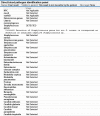Assessment of Rapid-Blood-Culture-Identification Result Interpretation and Antibiotic Prescribing Practices
- PMID: 28250000
- PMCID: PMC5405267
- DOI: 10.1128/JCM.02395-16
Assessment of Rapid-Blood-Culture-Identification Result Interpretation and Antibiotic Prescribing Practices
Abstract
Rapid pathogen identification can alter antibiotic prescribing practices if interpreted correctly. Microbiology reporting can be difficult to understand, and new technology has made it more challenging. Nebraska Medicine recently implemented the BioFire FilmArray blood culture identification panel (BCID) coupled with stewardship-based education on interpretation. Physician BCID result interpretation and prescribing were assessed via an electronic survey, with a response rate of 40.8% (156/382 surveys). Seven questions required respondents to interpret BCID results, identify the most likely pathogen, and then choose therapy based on the results. The tallied correct responses resulted in a knowledge score. General linear models evaluated the effect of role, specialty, and utilization of the BCID interpretation guide on the mean knowledge score. The specialties of the respondents included 55.7% internal medicine, 19.7% family medicine, and 24.6% other. Roles included 41.1% residents, 5.0% fellows, and 53.9% faculty. Most reported that they reviewed antimicrobial susceptibility results (89.4%) and adjusted therapy accordingly (81.6%), while only 60% stated that they adjusted therapy based on BCID results. The correct response rates ranged from 52 to 86% for the interpretation questions. The most common errors included misinterpretation of Enterobacteriaceae and Staphylococcus genus results. Neither role nor specialty was associated with total knowledge score in multivariate analysis (P = 0.13 and 0.47, respectively). In conclusion, physician interpretation of BCID results is suboptimal and can result in ineffective treatment or missed opportunity to narrow therapy. With the implementation of new technology, improved reporting practices of BCID results with clinical decision support tools providing interpretation guidance available at the point of care is recommended.
Keywords: antibiotic prescribing; antibiotic treatment; antimicrobial stewardship; bacteremia; blood culture; bloodstream infections; clinical decision support; microbiology laboratory results; rapid diagnostic testing; sepsis.
Copyright © 2017 American Society for Microbiology.
Figures
References
-
- Centers for Disease Control and Prevention. 2013. Antibiotic resistance threats in the United States, 2013. Centers for Disease Control and Prevention, Atlanta, GA: http://www.cdc.gov/drugresistance/threat-report-2013.
-
- Bauer KA, West JE, Balada-Llasat JM, Pancholi P, Stevenson KB, Goff DA. 2010. An antimicrobial stewardship program's impact with rapid polymerase chain reaction methicillin-resistant Staphylococcus aureus/S. aureus blood culture test in patients with S. aureus bacteremia. Clin Infect Dis 51:1074–1080. doi:10.1086/656623. - DOI - PubMed
MeSH terms
Substances
LinkOut - more resources
Full Text Sources
Other Literature Sources
Medical



